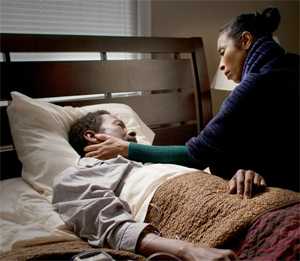Here’s a good question: If you died today what would you leave behind that you would be remembered for?
That’s the question being asked in the penultimate episode of HBO’s Treme.
No matter what happens in next Sunday’s final episode, the question now hangs over the entire series.The question takes on even greater weight in light of the growing critical backlash against Treme’s existence, which not surprisingly mirrors the show’s diminished ratings. Very few people in the world of contemporary American punditry appreciate anything but a clear winner.But today’s winner is tomorrow’s Lady Gaga.
Americans like their entertainment frothy and disposable. Give them teenage vampires, zombies, lovable serial killers and an endless supply of colorful mobsters rubbing each other out for sport. Anything to distract the viewers from the bad things that are being done to them in the real world. And they like “reality” television. That’s why the biggest show on earth stars a phony Christian moralizing about other people’s sexual behavior in terms characteristic of a seasoned connoisseur of pornography. Advice to TV producers: Don’t ask hard questions, unless they’re couched in some relentless overindulgence of sentimentality.
So David Simon, the journalist, novelist and unapologetic teller of stories with unsettling endings, gives us television about the tale of a depopulated city and the people who try to return and restore its culture despite a political apparatus designed to crush the life out of them.So it is that the next-to-last episode of Treme opens with a terrific live performance of the swing classic “Sing Sing Sing” being broadcast over live radio. The disc jockey hosting the broadcast compliments the players then starts ruminating about death. The DJ is the antic and always unpredictable Davis McAlary, so his performance is only mildly disturbing, but it does prompt Debbie Davis of the Pfister Sisters to ask “Davis, you OK?”
This is the point where Davis McAlary brings up the notion of legacy.The musicians responsible for the original music are all dead, Davis says morbidly, but at least they’ve left behind their music.
“A Legacy!” Davis notes.
The fool, which is McAlary’s role in the series, is able to utter the most simple of truths. The trigger for his sudden plunge into existentialism is his approaching 40th birthday, but the question he poses hangs over everyone in the production.It is particularly relevant to the character of Big Chief Albert Lambreaux, among the most defiant players in a notoriously defiant cast, the man who returned to New Orleans and refused to let his Mardi Gras Indian culture die. His jazz musician son Delmond had turned his back on the culture, but Lambreaux’s determination won him over. And now, on his deathbed, the Big Chief passes his role on to his son.“I’m not gonna make that walk,” says Albert, admitting that he won’t be around to lead his gang on Mardi Gras Day. “So you take my crown and adjust it so it fits.”
That’s legacy.
What is the legacy of HBO’s Treme? When the show has finished its run next Sunday, what will it be remembered for?
We’ll get to that next week. One thing I know for sure, though. When the ratings no longer matter, when the pundits stop wagging and the historians take over, HBO’s Treme is going to have a legacy that everyone involved will be proud of.
—John Swenson




